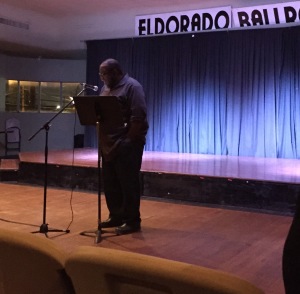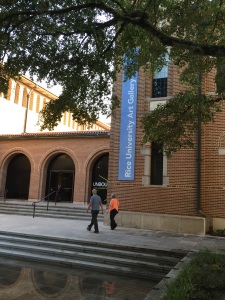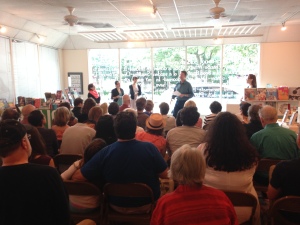Fred Moten packs the El Dorado Ballroom
April 4, 2016, by Erika Jo Brown
 On March 21st, a diverse community packed the historic El Dorado Ballroom to hear the words of Fred Moten. Moten, professor of English at the University of California, Riverside, is a celebrated scholar, who’s authored the critical books The Undercommons: Fugitive Planning & Black Study and In the Break: The Aesthetics of the Black Radical Tradition. In addition, his distinguished poetry collections include Hughson’s Tavern, B Jenkins, The Little Edges, and The Feel Trio, which was a finalist for the National Book Award in 2014.
On March 21st, a diverse community packed the historic El Dorado Ballroom to hear the words of Fred Moten. Moten, professor of English at the University of California, Riverside, is a celebrated scholar, who’s authored the critical books The Undercommons: Fugitive Planning & Black Study and In the Break: The Aesthetics of the Black Radical Tradition. In addition, his distinguished poetry collections include Hughson’s Tavern, B Jenkins, The Little Edges, and The Feel Trio, which was a finalist for the National Book Award in 2014.
Moten is known for his densely-packed lyricism, tackling social issues with wordplay, and complicating the conventional notions of radical poetic lineages. After an introduction by UH professor Michael Snedicker, Moten remarked that he “wanted to bring other voices” into the reading and played a “musical epigraph.” Some piano riffs, finger snaps, vocals, flute trills, and bass thrums later, the song, played uninterrupted in its entirety, was revealed as Carmen McRae’s version of the jazz standard “Sometimes I’m Happy (Sometimes I’m Blue).”
Earlier in the day, Moten delivered a talk on “Hesistant Sociology: Blackness and Poetry” at the University of Houston. There too, he employed musical epigraphs. One was a recording from a section from Zong!, the innovative masterwork by M. NourbeSe Philip, which linguistically and phonetically deconstructs the legal ruling of slave ship sailors who threw 150 humans overboard in the middle of the Atlantic Ocean in order to cash in on lucrative insurance. The other was a solo Thelonius Monk practicing his tune “I’m Getting Sentimental Over You.” Continue reading




